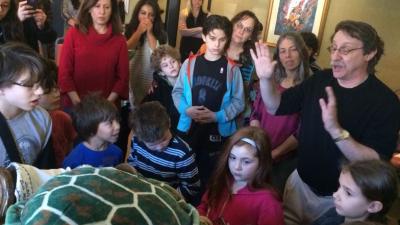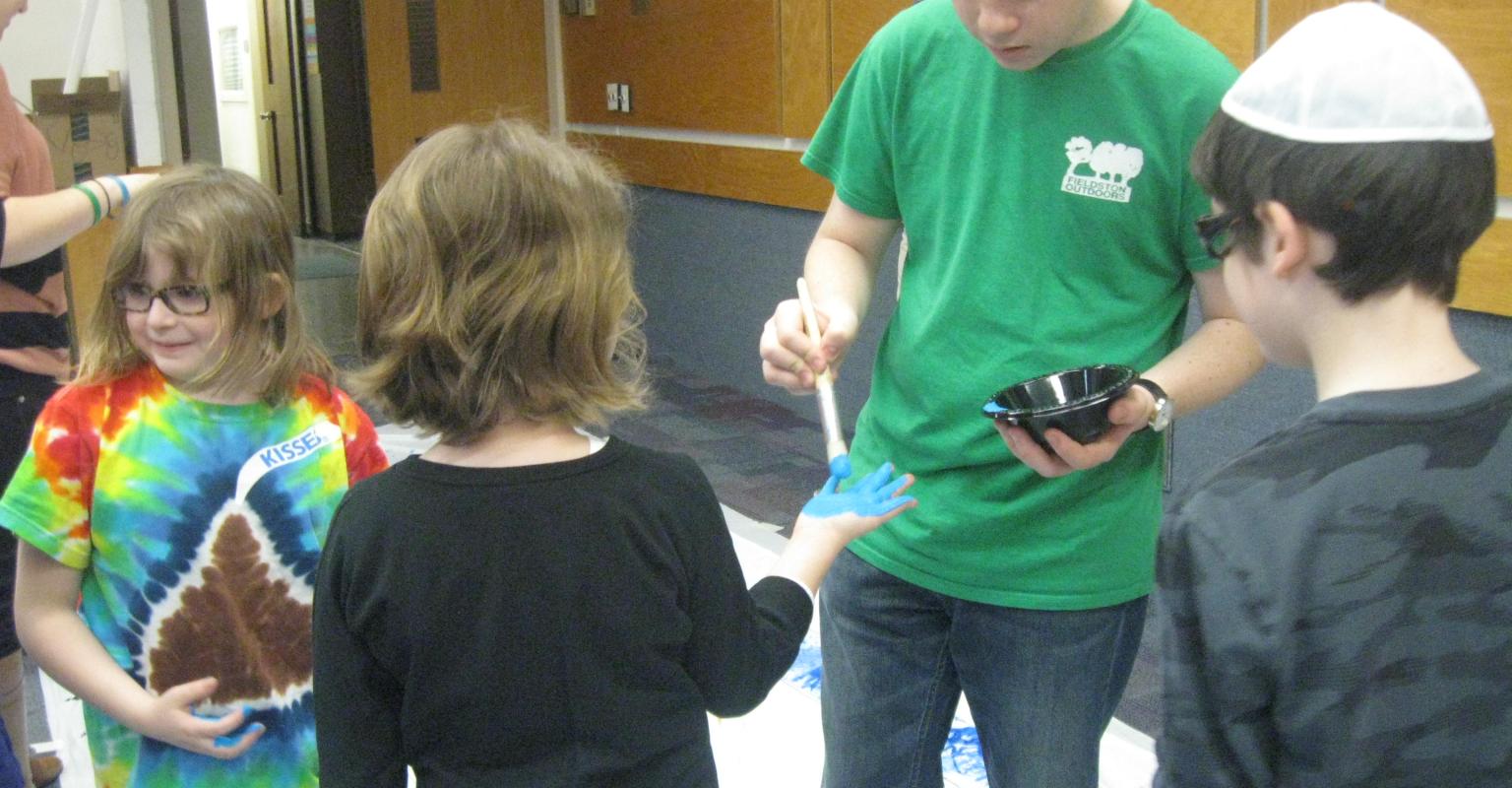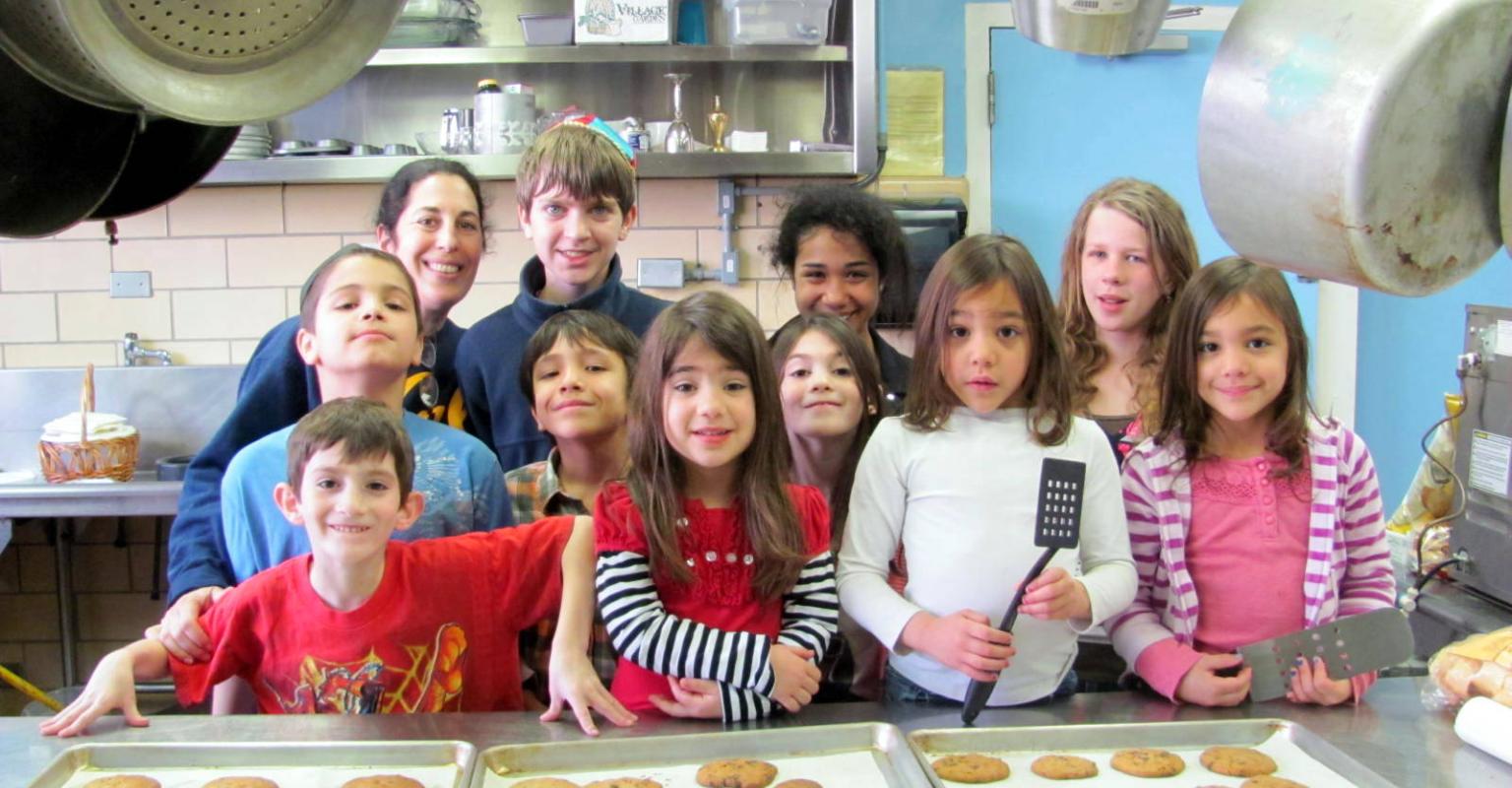Intergenerational Model: CTI Limud
Congregation Tifereth Israel (CTI), Glen Cove, NY

Model Summary:
CTI Limud is a congregation-wide learning model that is based on the premise that Jewish values, embedded in and learned through our stories (both modern and ancient), can be our guide in helping us to make our world a better place. All CTI learners and their families participate in hands-on experiential learning on topics that include: community building, prayer, storytelling, Israel, camp connections, leadership, and Torah study. Learning takes place at CTI, in congregants’ homes as well as out in the community.
Who are the Learners?
-
All school-age children and their parents who are members of CTI are learners in CTI’s new model, CTI Limud.
- There are about 65 students and 40 families participating in CTI Limud.
Who are the Educators/Learning Facilitators?
Educators include the rabbi, the cantor, the education director, a lead Hebrew teacher, a graduate student in Jewish Education from HUC who is interning at CTI, two additional teachers, parents, madrichim (counselors, leaders) and congregants.
When Does the Learning Happen?
-
CTI Limud is held on Wednesdays (4:45-6:15) for children and Sundays (9:00-12:00) for children and their families. The learning described in “What is the Learning” generally takes place on Sunday mornings.
-
There are also family services and learning experiences for Shabbat (x2), Havdalah (x2), Rosh HaShanah, Yom Kippur, Sukkot, Simchat Torah, Hanukkah, Tu B’Shvat, Purim, Passover, Yom Ha’atzmaut, Yom HaShoah and Shavuot.
-
CTI is in the process of designing Shabbat morning experiences for older students and their families.
- Families have also begun to invite one another for Shabbat dinner as part of Shabbat Babayit (in the home).
Where Does the Learning Happen?
-
Learning takes place at CTI, in congregants’ homes, and in the greater community (hospitals, men’s shelter, nursing home, etc.).
- In 2012-2013, the Limud High learners decided that they wanted a youth lounge at CTI. These teens designed and created their own space which they truly see (and use) as their special place at CTI.
What is the Learning? How is it Designed?
-
Kehillah: An important dimension to CTI’s high-impact model is the creation and building of the community. On Sunday mornings, parents and children join together from 9:30-10:00 for Kehillah. This is made up of spirited songs and an interactive dramatically told a story which ties in with CTI’s theme for this year. CTI also uses Kehillah as an opportunity to teach relevant modern Hebrew words, per parental request. CTI’s Limud Teens are given opportunities to be leaders of Kehillah.
-
Family learning on Sundays continues after Kehillah to include connections to Israel, intergenerational learning, Jewish camping, Torah study, and storytelling all through active participation.
-
On Wednesdays grades 3-7 have 30 minutes devoted to tefillah which is based on the Saturday morning service. Learning focuses on prayer fluency, the meaning of various prayers, and the structure of the prayer service. Grade levels are responsible for leading certain prayers to help learners feel comfortable participating in and leading a service.
- Empowering Teens: A very important part of Limud is the tremendous belief CTI has in empowering students to take part in creating their own learning. The Limud High students create their own curriculum based on what they want to learn. They are also participating in the Education Leadership Team since they are in the classrooms and know what is happening and how children are learning.
What Were You Trying to Achieve with this Model?
-
CTI did not want a drop-off model, they wanted something that would involve the parents.
-
CTI recognizes who their learners are, and who the families are (50% have intermarried). The education team compares their work to that of planting seeds.
- CTI listened and learned that families wanted experiential learning. Over the past five years, CTI has experimented with different types of experiential learning. Over time, they have found a balance between experiential learning and content to create powerful learning experiences.
Key First Steps and Recruitment Plan:
-
The education director writes a column in the congregational bulletin, which comes out four times a year.
-
The education director reports at the Board meetings.
-
The executive director and rabbi send out electronic weekly updates that include what is going on at CTI Limud.
- CTI uses social connectors, word of mouth, encourages people who see Limud in action, and those who are happy with Limud to speak with others. Even mid-year, Limud continues to gain new students.
Role of governance and Clergy:
-
Both the rabbi and the cantor have played major roles in Limud since its beginnings in 2009. Both have been involved in weekly or bi-weekly conversations around the design, goals, and experiences of Limud.
-
The rabbi leads the Kehillah (playing guitar) on Sundays and he also leads tefillah on Wednesday.
- The rabbi and cantor are also lead “characters” in the biblioancestry dramas. The rabbi plays guitar and the cantor leads singing during Kehillah.
Budget:
- The expenses for Limud, which included payroll for teachers, supplies/books, and food, totaled: $47,190.
Hiring Needs:
-
The ideal educators need to understand the CTI community and be willing and able to adapt learning to fit the community’s needs and desires.
-
CTI looks for creative, knowledgeable, and personable educators.
-
Building positive relationships with learners (children and their families) is an essential part of teaching at CTI.
- CTI looks for educators who see themselves as part of a team.
Relationship of Model to Congregational Learning System:
-
The model, which includes Kehillah (community), sharing stories, biblioancestors (acting out bible stories), and other powerful learning experiences replaces more traditional learning.
- Formal prayer-based Hebrew takes place in a more traditional classroom setting during the week.
How Do You Describe Your Congregation?
CTI is a liberal Conservative congregation. There are approximately 200 member units in the congregation, with 70 children and 40 families participating in Limud. There are one rabbi and one cantor. A volunteer lay leader has served as the education director; this year, CTI has hired a new education director. The teaching staff comprises the rabbi, the cantor, the Education Director, six teachers, and three one-on-one special education aides. The congregation’s priority goal is for learners of all ages to be on personal journeys towards lives that are actively engaged with the Jewish community and the world at large.
Supplementary Materials Include:
- Models-In-Action
- Intergenerational Learning
- Shabbat
- Jewish Text and Thought
- K - 2
- 3 - 5
- 6 - 7
- After School Programming
- Congregational Learning
- Early Childhood
- Educator Training
- Family Engagement
Discover more

A collection of Intergenerational Learning Models for innovation in Congregational Learning

Conservative Synagogue Adath Israel of Riverdale, Bronx, NY. Project Chaverim (friends) empowers teens in grades 10-12 to work with learners in grades 3 and 4, building community while strengthening Hebrew and prayer reading skills.

Ahavat Achim Synagogue, Atlanta, GA. Students and their families meet five times a year, outside of regular religious school hours, as a group based on geographic location, to celebrate and learn about mitzvot.
